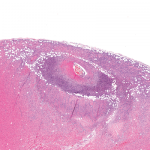Limitations of tocilizumab include cost, availability and limited data showing efficacy in treating intracranial GCA. The rarity of GCA-related stroke and the novelty of tocilizumab make it difficult to draw conclusions about the treatment’s effectiveness in preventing cerebral ischemic events. Interestingly, patients who suffered from ischemic complications due to GCA had lower tissue expression and serum levels of IL-6 than patients without ischemic events. A potential protective effect of IL-6 against ischemic events due to the angiogenic activity of IL-6 has been hypothesized.16
In monkey models, tocilizumab shows very poor CNS penetration, making its role in preventing intracranial ischemic events unclear.17 In a case study, a patient who switched from cyclophosphamide to tocilizumab experienced disease relapse resulting in GCA-related stroke and died shortly thereafter.18
Antiplatelet therapy—Due to significant overlap in GCA and atherosclerotic disease, it has been postulated that patients with GCA and atherosclerotic risk factors may benefit from antiplatelet or anticoagulant therapy at the time of diagnosis.
The role of aspirin has generated debate over the years, with the ACR recommending aspirin use when a patient has additional antiplatelet requirements. This approach is supported by a small-scale study involving 143 patients that found a decreased incidence of ischemic events, from 48% to 16.2%, in patients receiving antiplatelet or anticoagulant therapy.19
Given the low cost and availability of aspirin and statins, it may be beneficial to start patients on antiplatelet and/or statin therapy to prevent GCA-related stroke. This approach may be especially effective if the patient has pre-existing risk factors, such as a history of smoking, hyperlipidemia, hyperglycemia/diabetes mellitus and family history of atherosclerotic disease.
Conclusion
The prognosis for patients with GCA-related stroke remains poor, and the rate of relapse is high. Patients with concomitant atherosclerotic risk factors at the time of GCA diagnosis may benefit from antiplatelet and statin therapy, but further research is needed.
Patient education, multidisciplinary engagement between rheumatologists, neurologists and radiologists, and prompt intervention when GCA-related stroke is identified may help improve patient outcomes.
 Jessica Meek, MD, is an internal medicine resident at Brown University/Kent Hospital, Providence, R.I. She is interested in all things internal medicine and loves to teach.
Jessica Meek, MD, is an internal medicine resident at Brown University/Kent Hospital, Providence, R.I. She is interested in all things internal medicine and loves to teach.
 Anna Coppinger, DO, is an internal medicine resident at Brown University/Kent Hospital. She has a passion for patients with chronic medical conditions and autoimmune disorders.
Anna Coppinger, DO, is an internal medicine resident at Brown University/Kent Hospital. She has a passion for patients with chronic medical conditions and autoimmune disorders.
 Sejal Khan, DO MS, is an internal medicine resident at Brown University/Kent Hospital. Driven by a passion for delivering exceptional patient care, he is interested in innovative solutions in the field of musculoskeletal medicine, particularly the application of ultrasound for the treatment of musculoskeletal conditions.
Sejal Khan, DO MS, is an internal medicine resident at Brown University/Kent Hospital. Driven by a passion for delivering exceptional patient care, he is interested in innovative solutions in the field of musculoskeletal medicine, particularly the application of ultrasound for the treatment of musculoskeletal conditions.

